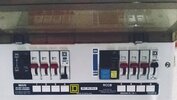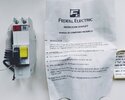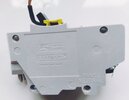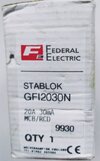Hi All, I need a new consumer unit - the old one is a Square D, and I need an uprated mcb for a more powerful shower - anyway, the electrician says I need to have the supplier come out and fit an isolator and the work should be free of charge... he also said its illegal for him to pull the main breaker as that involves cutting the seals. The supplier want to charge £100 for this task, does anyone know if this should or should not be a chargeable thing? Thanks for your thoughts!
You are using an out of date browser. It may not display this or other websites correctly.
You should upgrade or use an alternative browser.
You should upgrade or use an alternative browser.
Consumer unit change - needs isolator fitting?
- Thread starter nicam49
- Start date
The DNO sets the rules for their network. Some will charge for an isolator, some will not. Some will allow some electricians to pull the company fuse some will not. So its all down to your DNO.
Hi, Chivers67, yes I'll upload a pic on the morning. Do you want it with the cover plate on or removed or both?
Cover on should be fine, we will be able to identify the range and whether devices are available for it
Square D/ or schneider as they are now, had quite a few different product ranges over the years which didn't fit with one another and then when they were taken over things got renamed just to make it a little more confusing!
Square D/ or schneider as they are now, had quite a few different product ranges over the years which didn't fit with one another and then when they were taken over things got renamed just to make it a little more confusing!
Ah, original Quikline board / QO-E MCBS. As the shower is on the non-rcd side with no free ways the otherside, you'd need to change the MCB to an RCBO. QO-E was discontinued a while back, there was a retrofit range called QOVS which was compatable with the older QO-E based stuff, but it was more aimed at the commericial sector (only available in C type and had a big price tag). With a small board like that, I have to concur with the original advice that the best way forward is to change it. Ideally you want to be asking for all RCBOs and surge protection.
As to the isolator, who is it you have been in contact with? I think in licestershire you'll be in the old east mids electricity board area, who are serviced by western power* (who have now just renamed themselves to national grid), so it may pay to speak to them instead https://connections.nationalgrid.co.uk/make-a-change/isolation-switch
*privisation - don't ask (it is as fragmented as the railways)!
As to the isolator, who is it you have been in contact with? I think in licestershire you'll be in the old east mids electricity board area, who are serviced by western power* (who have now just renamed themselves to national grid), so it may pay to speak to them instead https://connections.nationalgrid.co.uk/make-a-change/isolation-switch
*privisation - don't ask (it is as fragmented as the railways)!
Hi, wonder if you'd like to see this pic of this STABLOK mcb/rcd made by Federal Electric that I rescued from a skip recently. Looks like NOS too.
Obviously can't find a use for it, which is prob. why it was in the skip in the 1st place! If anyone would like it for their museum, drop me a line - foc, just cost of posting, or collect from LE18... want more pics? Just ask!
Obviously can't find a use for it, which is prob. why it was in the skip in the 1st place! If anyone would like it for their museum, drop me a line - foc, just cost of posting, or collect from LE18... want more pics? Just ask!
Attachments
Last edited:
No, the supplier, not the DNO. It is the supplier who may or may not charge for an isolator - I don't think any DNO will have anything to do with anything downstream of the meter.The DNO sets the rules for their network. Some will charge for an isolator, some will not.
Yes, I gather that some DNOs may sometimes give some electricians 'permission' to pull their fuses (although I think that's fairly rare) - and, in this case, you're right that it is the DNO (whose fuse it is) that matters.Some will allow some electricians to pull the company fuse some will not. So its all down to your DNO.
Kind Regards, John
As I said, some do, sometimes - but it seems that even a particular DNO is not necessarily consistent about this - does it perhaps just depend upon to whom one speaks?SSE Always tell me its fine for me to pull main fuse
Kind Regards, John
- Joined
- 27 Jan 2008
- Messages
- 28,067
- Reaction score
- 3,407
- Location
- Llanfair Caereinion, Nr Welshpool
- Country

The HSE says no live working, so following their rules one must disconnect the supply before removing the cover from the consumer unit, elsewhere, not in the consumer unit its self.
So the supplier should provide a means to disconnect the supply, however often they don't, and two wrongs do not make a right, so one could ask the supplier to disconnect while the electrician works on the CU but there is nothing to say this must be free of charge.
So often we break the rules, we remove the DNO fuse and fit an isolator, and then the CU, and we then say we have noticed that the seal has been broken on the fuse, would they like to replace it, and we both know rules have been broken, and we both turn blind eyes to it.
In the main the DNO is only worried about the seal if they think your stealing electric, but it is like the 30 MPH speed limit, one can get away with speeding many times, but then some one will get done for just 4 MPH over, it just depends on the guy who catches you.
I know the seal on my fuse is broken, and I have photos of it being broken over many visits from meter reader, only as that the way I record meter reading, and the fuse is often in the picture, clearly in my area no one is worried.
So the supplier should provide a means to disconnect the supply, however often they don't, and two wrongs do not make a right, so one could ask the supplier to disconnect while the electrician works on the CU but there is nothing to say this must be free of charge.
So often we break the rules, we remove the DNO fuse and fit an isolator, and then the CU, and we then say we have noticed that the seal has been broken on the fuse, would they like to replace it, and we both know rules have been broken, and we both turn blind eyes to it.
In the main the DNO is only worried about the seal if they think your stealing electric, but it is like the 30 MPH speed limit, one can get away with speeding many times, but then some one will get done for just 4 MPH over, it just depends on the guy who catches you.
I know the seal on my fuse is broken, and I have photos of it being broken over many visits from meter reader, only as that the way I record meter reading, and the fuse is often in the picture, clearly in my area no one is worried.
True, albeit it is usually the DNO, not the 'supplier' who would temporarily disconnect the supply.So the supplier should provide a means to disconnect the supply, however often they don't, and two wrongs do not make a right, so one could ask the supplier to disconnect while the electrician works on the CU but there is nothing to say this must be free of charge.
There's really no option but to 'turn bind eyes', since there is absolutely no way of proving, in retrospect, who broke the seal, and when. I see a lot of newly-purchased (usually in poor condition) properties, and the seals of DNO fuses are broken in a very substantial proportion of cases. That was the situation in my house when I moved in, a long time ago.So often we break the rules, we remove the DNO fuse and fit an isolator, and then the CU, and we then say we have noticed that the seal has been broken on the fuse, would they like to replace it, and we both know rules have been broken, and we both turn blind eyes to it.
Forgetting about rules and regulations, there is also the issue of common sense (and 'self preservation'. If, for whatever reason, one has decided against the 'proper route' (getting DNO to pull fuse, that leaves only two options - to pull the fuse oneself or to 'work live' - and I know which one of those I would personally go for!
Kind Regards, John
As stated earlier it depends who the DNO is. I used to work for edf and across various DNO’s. Some will, some wont. Some suppliers will , some wont. It depends on the area.
Kind Regards, Old Salt
Kind Regards, Old Salt
One recent customer showed me letters laying out the terms and cost of visits for survey and install an isolator, at the survey he was told an isolator would be fitted (something like a couple of days later). The initial letter for survey ~£200 arrived the day after the fitting and several days later another letter estimating the cost of fitting ~£100, complete with a tear off slip to book the fitting. He was still waiting for an invoice
DIYnot Local
Staff member
If you need to find a tradesperson to get your job done, please try our local search below, or if you are doing it yourself you can find suppliers local to you.
Select the supplier or trade you require, enter your location to begin your search.
Please select a service and enter a location to continue...
Are you a trade or supplier? You can create your listing free at DIYnot Local




